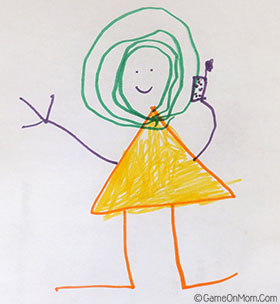Understanding Early Intervention
As always, the recent holidays provided an opportunity for joyous interactions with family. Like most families, our members differ greatly in lifestyle, personality, and beliefs. Therefore, these “joyous interactions” force every family member to run for the chardonnay. As if family gatherings were not bad enough, I am now dealing with a secret concern that I do not dare debate or even mention to the family. It’s become both a personal and professional dilemma for me. Let me explain…
 I have an adorable niece who is very loving and kind. She says “wuv woo” and asks me to pass the “moo”. When she mumbles half-words and grunts to communicate, the entire table roars with laughter and comments on how precious she is. Her parents finish her sentences and translate for her, never requiring her to fully communicate on her own. This behavior may be “cute” for a one year old who is just developing the ability to communicate using words. However, my niece is 3 ½! Clearly, she is suffering from a speech delay that is misinterpreted by the entire family as “cute”.
I have an adorable niece who is very loving and kind. She says “wuv woo” and asks me to pass the “moo”. When she mumbles half-words and grunts to communicate, the entire table roars with laughter and comments on how precious she is. Her parents finish her sentences and translate for her, never requiring her to fully communicate on her own. This behavior may be “cute” for a one year old who is just developing the ability to communicate using words. However, my niece is 3 ½! Clearly, she is suffering from a speech delay that is misinterpreted by the entire family as “cute”.
As her aunt, I try to be patient and kindly assist her in articulating requests. I sit with the family and bite my tongue each time the group finds her inability to talk “just adorable”! As a special educator with over fourteen years in the field, I feel that I am neglecting the educational needs of a struggling child who will never be prepared for kindergarten without help. This is my dilemma. Do I say nothing and keep peace in the family, or do I encourage the parents to seek early intervention services, knowing that they will be highly offended by this suggestion? Both options have their risks. Do I risk the relationships with family members, or do I risk my niece entering kindergarten with a serious communication delay?
It is clear to me that my niece needs an evaluation with an Early Intervention Specialist so that she can be determined eligible for speech services. What is Early Intervention? Early Intervention is a system of services to assist children with developmental delays. The goal of early intervention is for all children to enter kindergarten “on an even playing field” and with necessary support services already in place.
In every state, early intervention programs are established and, in most cases, interventionists will come out to the home to determine if a child is delayed in one of the following areas:
- physical (reaching, rolling, crawling, and walking);
- cognitive (thinking, learning, solving problems);
- communication (talking, listening, understanding);
- social/emotional (playing, feeling secure and happy); and
- self-help (eating, dressing).
In many cases, a child’s pediatrician will notice a delay and refer the child for an evaluation with Early Intervention. However, parents cannot count on all pediatricians doing so. In many cases, pediatricians see a large number of children in one day and often don’t spend enough time with each child to get a full picture of the child’s development in certain areas. Quite often, the doctor will ask the parents questions about their child’s milestones. Some parents answer these questions honestly and the pediatrician is able to determine that milestones are not met. Other parents simply believe that their child has no difficulties and quickly dismiss the doctor’s concerns, if any.
If a doctor does not pick up on a delay and a parent is still concerned, they can act as the child’s advocate and request early intervention services on their own. Parents can find information about early intervention programs very easily on the internet. Each state has intervention programs in place. Parents can also access a wealth of information on the National Dissemination Center for Children with Disabilities site at nichcy.org.
An evaluation with an Early Interventionist is free and in most cases subsequent services are free or covered by a child’s health insurance. A parent is not obligated to agree to services if it is determined that a child is in need. The evaluation simply assesses the child’s development and identifies the specific area in which the child could use some additional support. Once the evaluation is complete, the parent is in control of how they use the information.
For example, I have a friend whose daughter was born a month after my daughter. A few years ago, I noticed that her daughter did not use words to communicate. She had specific sounds that she used for juice, milk, toys, etc., but she never spoke the actual word for the item. I felt comfortable suggesting to my friend that there was a potential issue with her daughter’s speech development. It also helped that there was a clear difference between my daughter’s speech and her daughter’s “sounds”. When a parent is able to compare their child with a same age peer, it is often more obvious that a delay is present. As a result, the child was evaluated in the home by and Early Intervention Specialist for developmental delays. The communication evaluation determined that she was an entire year behind in speech development. In this case, the parent chose to move forward with the recommendations and the child immediately began receiving speech services twice per week. In addition, the child was able to attend a public pre-school handicapped program for two years prior to kindergarten. Today, the child no longer requires speech therapy and is thriving in public school at grade level.
I still have no idea how I will address the issue within my own family. I am hoping that her pediatrician eventually takes notice or that posts similar to this will eventually reach my niece’s parents. In the meantime, I’ll just have to keep the peace by passing the “moo” at holiday dinners.




















-10 Comments-
It is cute when they are 1 but like you said in this post, it shows an issue when they are 3 1/2. I have a brother who has a speech impediment and he is in his 50’s. Yea, it was cute then but has been an embarrassment for many years and I’m sure had it been recognized as such many years ago, the outcome would have been different. Thanks for trying to bring this subject to light for many people. It’s so worth it!
Sheila Bell recently posted..Dress United
my son just turned three and we are getting him evaluated. he was late to walk and eat solids and still has some other delays in addition to speech. I am not too worried since he does bust out with a proper sentence when he is motivated enough, but it is still important to get him started in some therapies.
Rowan recently posted..Easy Diaper Changes with ZIPaboo!
I agree with on this– I know that it is a delicate situation because this is family but I think you should bring it their attention. They may not agree with you or even may be upset but I think in the long run they will understand and appreciate your awareness 🙂
Yes, it is cute when they are that young, but not at her age! I would definitely say something! It’s not like you do not know what you are talking about. And while it may cause some hard feelings at first, they will soon see it was for the best! Do not let that girl grow up without the help she so clearly needs. Get it now, not later!
kids should be trained at a very young age, we decline them because we love them. they’ll take us when they grow up to be a find young individual with good manners and respectful to others. caregivers or parents are credited for that because that simply means they raise their kids properly/.
jheylo recently posted..Our new kitchen wonder tool: Magic Bullet
Great information! I have a few friends who have had their children evaluated and Early Intervention has been so helpful to them! Thanks for sharing!
Michelle F. recently posted..Project Pomona New Cargo Shorts Review & Giveaway!
I think you should say something. Sure, you may risk alienating your family members, and that would be devastating and completely unfair, but your niece needs help NOW. Just my two cents… 🙂
Elisebet F recently posted..A day at the beach
This hit home for me. I think my toddler has a delay in speech but I don’t want to push him if he is just taking his time. He is almost two but if he doesn’t start talking more soon, we are going to get him some help.
Nickida recently posted..Homemade Cookies Delivered from Sweet Andy’s
Early intervention is so important, and not many people know what is available to them. Thanks for the information!
Thank ou so much for validating one of my concerns about my grandson – at 2-1/2 he barely talks. He seems to be a happy child, but he still his verbal language skills seem to have been delayed.